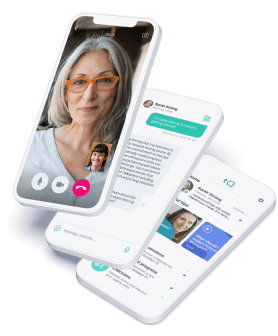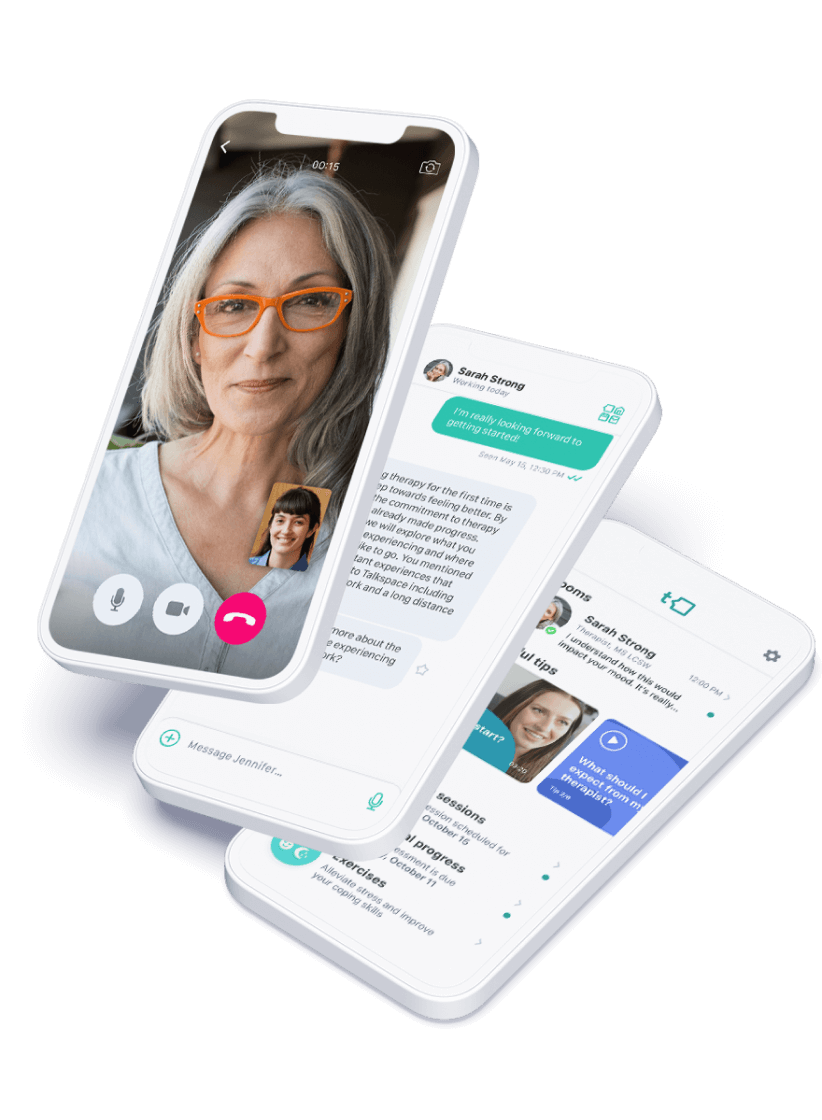Updated On: June 5, 2024
Overview
Wondering how to get diagnosed with depression? The WHO and CDC both report that about 5% of adults experience depression each year, and those statistics are pre-COVID. Research from Boston University shows depression rates went up a staggering 300% at the beginning of the pandemic, and that number is even worse now.
Adult and teen depression often goes unnoticed, but if you feel like you have been more depressed than normal, and it’s been going on for a while, it might be time to connect with a mental health professional.
While it’s important that you don’t attempt to self-diagnose, keeping a list of depressive symptoms you notice and sharing it with your doctor can be helpful.
Wondering if you have depression? Get answers by taking a free online depression test today.
Read on to discover how to get an official depression diagnosis and to learn some proactive steps you can take to feel better if you are depressed.
Get a Psych Evaluation
Want to know how to get diagnosed with depression? The process begins by reaching out to your family doctor or another medical professional and requesting a psychological evaluation. While there isn’t a specific laboratory test that can show depression, there is a standard procedure that leads to a depression diagnosis. A doctor will conduct a full evaluation and likely do blood work to rule out any medical conditions that may be contributing to any depression symptoms.
If you’re seeking an alternative or more accessible approach, Talkspace offers a supportive path. After your initial medical consultations, you can connect with our online mental health providers for further assessment. We specialize in diagnosing depression and providing a personalized treatment plan without the need for in-person visits. This simplifies your mental health journey, allowing you to start your treatment from the comfort and privacy of your home.
How Does a Doctor Diagnose Depression?
If you’ve been in a continuously depressed mood lately, it’s normal to be wondering: How do I get diagnosed with depression? Doctors look for certain key symptoms when diagnosing someone for depression. They consult the Fifth Edition of the Diagnostic and Statistical Manual of Mental Disorders (DSM-5) to make a depression diagnosis. The DSM-5 states you need to have experienced at least 5 of the following symptoms, for a minimum of two weeks, to be diagnosed with major depressive disorder (MDD).
- Sadness
- Appetite change
- Inability to focus
- Irritability and agitation
- Consistent lack of energy
- Feeling worthless or guilty
- Repetitive thoughts of suicide or death
- Problems falling asleep or staying asleep
- Loss of interest in things you once enjoyed
- Feeling detached, like you’re moving in slow motion
It’s not uncommon for a primary doctor to refer you to a psychiatrist or other licensed mental health professional. This could be the case, especially if your blood work and other preliminary tests don’t show any underlying medical condition that might cause feelings of depression.
What to expect
To prepare — journal: You may be asked to keep a journal of your feelings and thoughts for a period before your appointment. Your entries might offer insight into important information about your mental health condition, low mood, and why you’re feeling depressed. Don’t hold back while writing. Be as candid as possible.
List your medications: You’ll be asked to bring a list of the medication you’re currently taking. They’ll want to know about recreational drugs, prescription medications, vitamins, over-the-counter drugs, and natural medicines.
Types of assessments: Your evaluation can take several hours to complete. You’ll undergo in-depth psychological evaluation and testing. A doctor can reference several sources to assess you, including:
- Observational and medical evaluation data
- Questions about your behavior, mood, and daily activities
- Norm-referenced psychological tests
- Questionnaires like the Zung scale, the Hamilton Depression Rating Scale (HDRS), or the Beck Depression Inventory (BDI)
- Informal tests and surveys
- Interview information
- Medical records
- Family psychological history
Bring someone with you: You might bring your significant other or another family member to your evaluation appointment. They may be able to provide unique perspectives and insights that can help the doctor accurately assess your condition and needs. It can also be beneficial for your significant other to learn about dating someone with depression from a professional.
Make a list of questions: In the days before your assessment, it’s a good idea to make a list of any questions you have. This will help you to remember to address issues that are most important and have the most impact on your life.
There’s no standard psychological assessment that works for all people equally. Having depression diagnosed isn’t a one-size-fits-all process. Your doctor will choose the types of assessments and tests they feel are best suited for your unique circumstances. Be prepared for lengthy testing sessions and to answer sets of similar questions repetitively during the depression screening process.
There are no physical risks involved with a psychological evaluation. However, you should know that it’s pretty common to experience a surge of emotions during the diagnostic process. Some reactions to psychological evaluations can include fear, anxiety, resentment, and hostility. Breathe deeply, relax your mind, answer all the questions to the best of your ability and honestly, and trust your doctor to make an accurate diagnosis.
There are several different types of depression. Determining which you have is essential to you getting the best help possible. A doctor may diagnose you with:
- Major depressive disorder (MAD)
- Seasonal affective disorder (SAD)
- Postpartum depression
- Atypical depression
- Cyclothymia
- Dysthymia
“Understanding depression and how it looks and feels for you can be a helpful first step in learning about options for how to start to feel better. Working with a licensed mental health professional on managing and decreasing your depression symptoms can take some time and experimenting to see what works for you, but the process will be worth it. You will not feel this way forever, there is hope, and you deserve help.”
 Licensed Mental Health Counselor (LMHC), Licensed Professional Counselor (LPC), MA Kate Rosenblatt, MA, LPC, LMHC
Licensed Mental Health Counselor (LMHC), Licensed Professional Counselor (LPC), MA Kate Rosenblatt, MA, LPC, LMHC
How to Get a Depression Diagnosis with Talkspace
If you suspect you have depression or a loved one has suggested you might be depressed, don’t wait to get help. You can access support through Talkspace, where a licensed provider will evaluate your symptoms, listen to your concerns, and, if appropriate, diagnose you with depression or another condition.
Talkspace offers a convenient and affordable way to receive a diagnosis and treatment for depression, with online therapy and psychiatry plans that take insurance. Your specific insurance plan will determine your individual costs, but most copays are $25 or less. If your insurance doesn’t cover Talkspace, check with your employer to see if they cover Talkspace directly, use an FSA/HSA card, or pay out-of-pocket at a cost that’s less than most in-person providers.
Here’s how it works:
- Get started any time by answering a few questions on the Talkspace website or app—no referral required. You can choose therapy, psychiatry, or both.
- You’ll be connected with a therapist within about two days or a psychiatric provider within about a week.
- If you choose to start with therapy, you can message with your therapist as much as you like and also schedule live sessions. If you choose psychiatry you’ll schedule a live video session with your psychiatric provider.
Online therapy helps you develop thought patterns and coping skills to reduce depression symptoms, while online psychiatry addresses the physiological basis or your symptoms, usually with a prescription for medication and ongoing medication management.
What to Do if You Get Diagnosed with Depression
If you’re diagnosed with any type of depression, know that you are not alone. Help and effective depression treatment is available, and there are simple, effective lifestyle changes you can make to begin feeling better, often right away. Let’s look at how to deal with depression through some self-care and other techniques that can help keep you grounded and more positive in your daily life.
Seek professional guidance
Depression isn’t something to feel ashamed of or guilty about. More than 16 million Americans experience this mental health condition every year. In most cases, depression is treatable with the right help. Therapy for depression can be very restorative. Sessions with a mental health professional in a safe, unbiased environment can be an effective solution for people who want to learn how to treat depression. You’ll learn to anticipate, recognize, and cope with your depressive symptoms more effectively.
Train your brain to reduce negativity
Mindfulness meditation is a powerful weapon for battling depression. Regular practice will teach you to witness your thoughts as they occur, which allows you to recognize negative thought patterns as they develop. When you learn to see them, you can proactively work to replace them with positive thoughts and mantras. Meditation puts you in touch with yourself and allows you to see depression and take back the power it holds over you.
Deep breathing
Breath control is a key element of mindfulness meditation. If you take ten deep, slow belly breaths, you can shift your thinking. It’s impossible not to. Here’s a simple exercise that’s known as the 4-7-8 technique. You can try it right now and judge the effects for yourself:
- Think about your breath
- Exhale all the air from your lungs
- Inhale slowly, in a controlled manner, for a slow count of 4
- Hold your breath for a slow count of 7
- Exhale slowly and controlled for a slow count of 8
- Repeat ten times
During the process, make it a point to center your thoughts on your breath as it’s going in and out of your nostrils. If your thoughts start to stray away, gently pull them back to your breath. Note that if your mind wanders, it’s normal. The key is to realize and pull your thoughts back in. If you practice this routinely, you’ll naturally become more adept at it.
The effects of deep breathing are significant, immediate, and can be obtained anywhere, at any time, for free. Use this technique whenever you begin to feel a depression symptom or anxiety. Recenter your thoughts and remind yourself of how you intend to feel. This is your day, in your life, and you are allowed to be happy!
Finding the Right Depression Treatment For You
Choosing effective treatment for depression can depend on your personal preferences. There are numerous depression treatment options, such as natural remedies for depression, antidepressant medication, light therapy for depression, and talk therapy. Treatment is unique to each case, so consulting with a mental health professional can help you narrow it down and find the best option for you.
There are other things you can do to feel better when you’re depressed. What do you like to do? What brings you happiness and peace? Consider:
- Cooking
- Learning something new
- Creating something artistic
- Dancing
- Singing
- Eating a healthy diet
- Breaking a sweat during an intense workout
- Ensuring you get a proper night’s sleep
- Staying hydrated
- Spending time with friends
All these things can help improve your low mood. The world has seen a lot of depressing circumstances over the years. It’s understandable if you find that you feel depressed.
However, if you’re experiencing depression at work, in your interpersonal relationships, or feel like your depression is to the point where it’s affecting your ability to perform well in your life, consider reaching out to a mental health professional and scheduling a psychological evaluation. This is an excellent start to managing your depression long-term.
Platforms like Talkspace make getting online therapy easier than ever. This affordable, convenient, secure approach to talk therapy is changing how people think and feel about getting the mental health care they need. Learn more about the causes of depression and how we can help you treat and manage your depression.
See References
-
Depression
Who.int. Published 2021. Accessed March 11, 2022.
-
Depression
FastStats. Cdc.gov. Published 2022. Accessed March 11, 2022.
-
Depression Rates in US Tripled When the Pandemic First Hit—Now, They’re Even Worse
McKoy J. Boston University. Published 2021. Accessed March 11, 2022.
-
Norms for Zung’s Self-rating Anxiety Scale
Dunstan D, Scott N. BMC Psychiatry. 2020;20(1). doi:10.1186/s12888-019-2427-6. Accessed March 11, 2022.
-
Validation of the Hamilton Depression Rating Scale (HDRS) in the Tunisian dialect
Cheffi N, Chakroun-Walha O, Sellami R et al. Public Health. 2022;202:100-105. doi:10.1016/j.puhe.2021.11.003. Accessed March 11, 2022.
-
Facts & Statistics
Anxiety and Depression Association of America, ADAA. Adaa.org. Accessed March 11, 2022.

Kate Rosenblatt, MA, LPC, LMHC, was the Senior Clinical Manager at Talkspace until 2022, and is a clinical therapist licensed in CT and NY. A member of the American Psychological Association (APA), Kate completed her Master's degree in Counseling Psychology at Lesley University in Cambridge, MA. She has over 10 years of experience working with adults on a variety of issues, specializing in eating disorders and working with people going through life stressors such as finding your purpose, career changes, and connecting with your intuition.
Articles about Depression: Symptoms, Causes & Treatment
View all articles
What to Do if Your Teenager is Making You Feel Depressed

Post-Weaning Depression: Recognize the Signs & Find Support

How to Think Positive When Depressed: Techniques for a Brighter Outlook

Have You Fallen Out of Love, or Are You Depressed?

How to Prevent Postpartum Depression

How to Explain Depression to Someone

Are There Stages of Depression?

Can Adderall Cause Depression?

Can Depression Cause Memory Loss?

14 Effective Coping Skills for Depression


